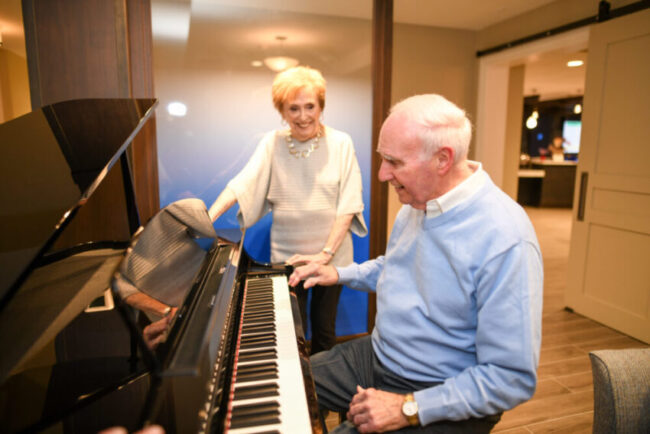The Powerful Connection Between Music and Memory

Music has a powerful connection to memory, offering a variety of benefits for individuals with dementia, a general term for a decline in memory and cognitive function caused by brain disease or injury. Alzheimer’s disease is the most common form of dementia, responsible for 60% to 80% of all cases. has shown that music can help reduce agitation, depression and anxiety while also enhancing cognitive function in individuals with dementia.
Why Is Music So Powerful for Individuals with Alzheimer’s?
Researchers believe that engaging with music—whether through singing or listening to favorite songs—can have a profound impact, as the brain regions associated with music are less affected by Alzheimer’s and other forms of dementia. Studies show that listening to or singing familiar songs can bring significant benefits to individuals with Alzheimer’s or dementia, lifting spirits, sparking recollections of personal experiences and creating moments of connection.
Music also provides relief for caregivers. If you have a loved one with dementia, you may find that music helps improve communication and fosters a stronger connection.
At New Pond Village, we recognize the significant role music plays in enhancing the quality of life for residents in our Mind & Memory Care neighborhood. Here’s how we use music to stimulate engagement, spark memories and bring joy to everyday moments.
Recalling Emotions Through Music
The part of the brain that stores long-term musical memories is usually one of the last areas affected by Alzheimer’s disease. While scientists aren’t entirely sure why this area is preserved, they know that even in the later stages, many people with dementia can still recognize familiar songs or sing along.
Neurologists have found that music can trigger memories and emotions associated with past events. Music can “awaken” the brain in powerful ways—boosting mood, encouraging social interaction, and helping people feel more connected to themselves and others.
Some researchers think music may have even more profound implications for dementia treatment. According to Harvard Medicine, “by identifying the exact type of music able to provoke a particular cognitive, motor, or emotional response, there could be progress toward healing, improving, or compensating for disrupted brain function in various diseases.”
In other words, researchers aim to discover new methods for mitigating memory loss by identifying the specific types of music that elicit particular responses.
Reducing Stress and Enhancing Well-Being
Researchers have found that musical intervention is effective in reducing anxiety in individuals with dementia. By engaging familiar rhythms and melodies, music can create a calming environment, ease agitation and promote a sense of emotional well-being.
Music activates multiple areas of the brain at once, including those responsible for movement. When combined with physical activity, music becomes even more powerful, enhancing coordination and fostering a deeper emotional connection. Since music requires minimal cognitive effort, even individuals with severe impairment can engage and benefit from it.
Strengthening Connections and Encouraging Interaction
By evoking positive memories and emotions, music encourages both physical and emotional closeness. Listening to music activates the right side of the brain, while singing engages the left, creating a holistic brain-stimulating experience.
For individuals in the later stages of dementia, music can inspire movement and expressions of affection, such as dancing or hugging. These moments of connection can help them feel more secure and may even unlock additional memories.
Making Music a Part of Daily Life
At New Pond Village, we integrate music into daily routines within our Mind & Memory Care neighborhood. By selecting familiar music, which promotes movement and fosters a positive mood, music becomes a powerful tool to stimulate memory, encourage interaction and create meaningful personal connections in individuals with dementia.
Music and memory are deeply intertwined. At New Pond Village, we use purposeful musical engagement to uplift our residents, foster connection and enhance overall well-being—one meaningful moment at a time.
Mind and Memory Care at New Pond Village
In our Mind & Memory Care neighborhood, we prioritize creating an environment that supports both the physical and emotional well-being of each resident. With personalized care plans tailored to their individual needs, we offer a thoughtful approach to daily living, ensuring that every detail—from sensory dining experiences to carefully chosen colors, lighting, and music—enhances comfort and connection. Our goal is to empower residents by keeping them engaged, active and part of a vibrant community, where each moment is meaningful and every need is thoughtfully met.